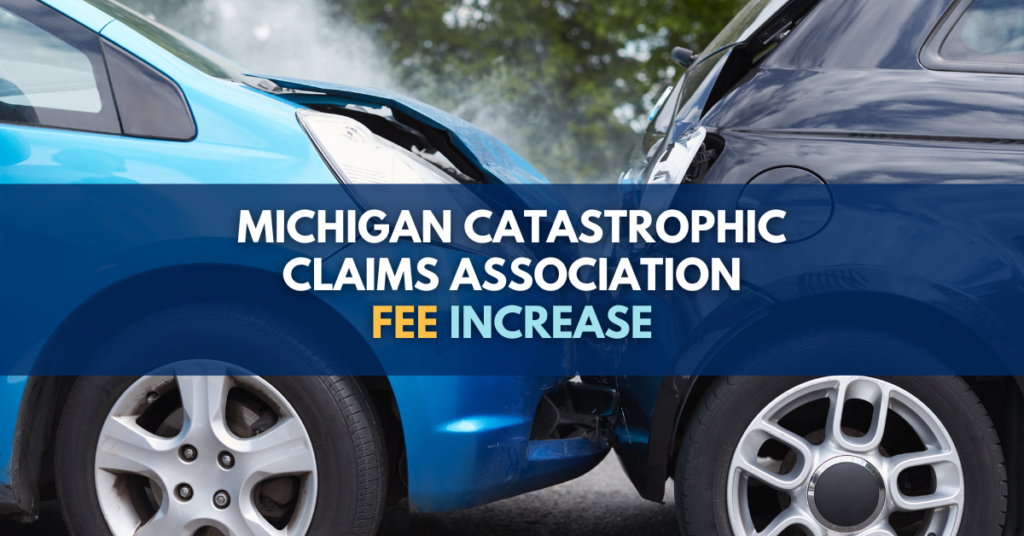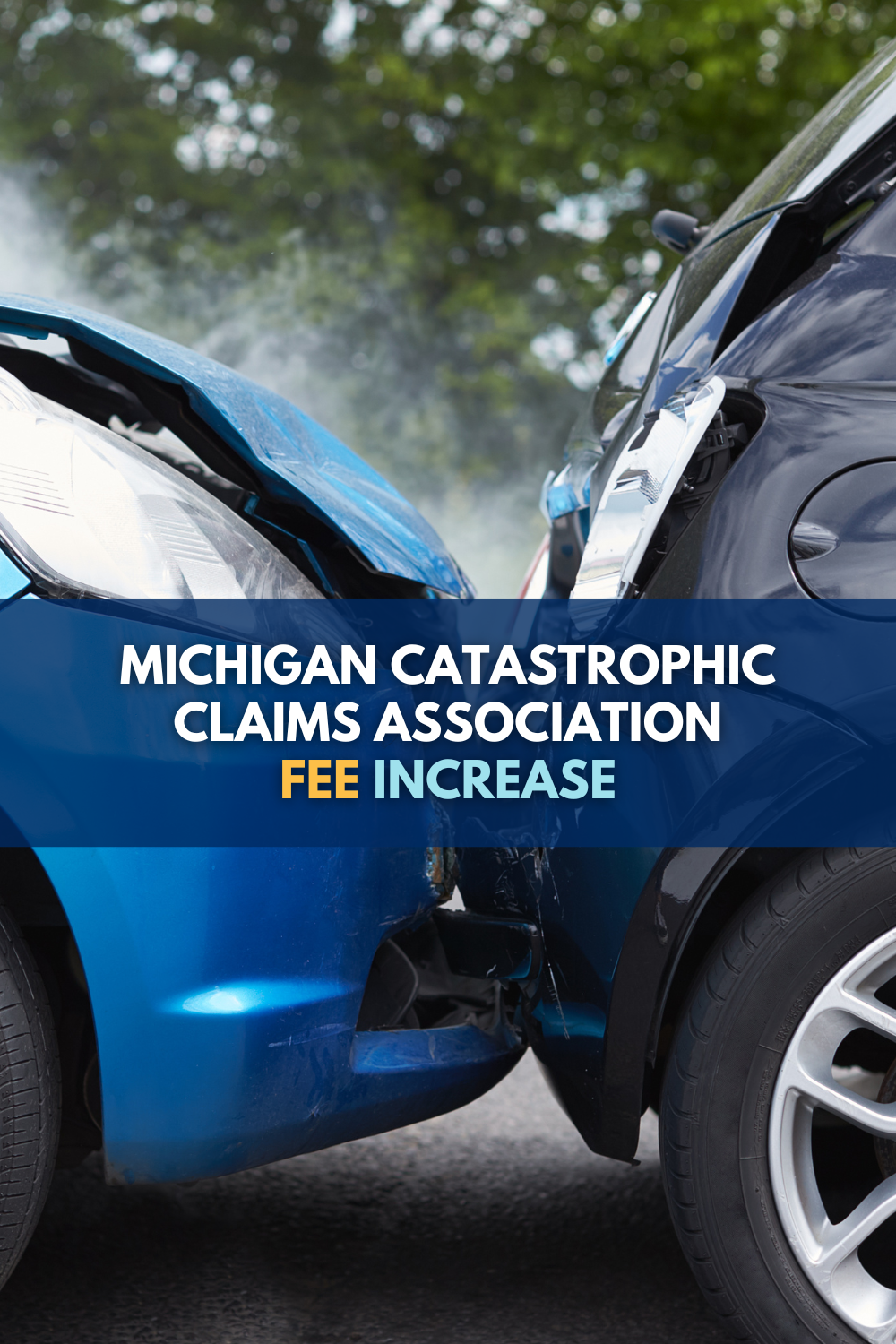
The increase in the Michigan Catastrophic Claims Association fee (MCCA fee) that takes effect on July 1, 2023, is attributable to their investments losing more than $5 billion in value and also paying $3 billion in refunds to drivers. These losses contribute to the $3.7 billion deficit the MCCA finds itself in.
Starting on July 1st and continuing through June 30, 2024, drivers who have unlimited No-Fault PIP medical benefits will have to pay the Michigan Catastrophic Claims Association assessment fee of $122, which is $36 more than they paid from 2022-2023. Drivers with other PIP coverage levels will have to pay a $48 fee. They were not required to pay a fee previously from 2022-2023.
Unfortunately, because of the poor performance of the Michigan Catastrophic Claims Association’s stocks and bonds investments and the poorly timed and poorly thought-out $3 billion refund plan, the MCCA’s $5 billion surplus that existed at the end of Fiscal Year 2021 has been squandered and in its place we are burdened with a $3.7 billion deficit by the end of Fiscal Year 2022.
As this MCCA fee increase demonstrates, we – the driving public – are left to foot the bill.
How much is the increase in the Michigan Catastrophic Claims Association (MCCA) fee?
The MCCA assessment fee for 2023-2024 will be $122 for drivers with unlimited No-Fault PIP medical benefits coverage, which is a $36 increase from 2022-2023. For drivers with less than unlimited coverage, the fee is $48 for 2023-2024. The fee for those drivers was $0 for 2022-2023.
Why is the Michigan Catastrophic Claims Association increasing the assessment fee?
In its September 22, 2022, release announcing the MCCA fee increase for 2023-2024, the association blames both the Michigan Court of Appeals ruling in Andary vs. USAA in August 2022 for “[h]igher-than-anticipated claims costs” and “[l]ower than expected investment returns.”
There was nothing Andary that could have been unanticipated by the Michigan Catastrophic Claims Association. Like the Department of Insurance and Financial Services (DIFS), the Michigan Catastrophic Claims Association knew about all Andary, the issues involved, and the potential consequences for the association’s claims cost projections.
That’s why the Michigan Catastrophic Claims Association – like the DIFS – filed its amicus curiae brief in Andary with the Michigan Court of Appeals on August 16, 2021. That was a full year before the court issued its opinion.
As for the association’s “investment returns,” they were indeed low. A little over $5 billion low.
According to the Michigan Catastrophic Claim Association’s October 7, 2022 Annual Statement for the FY 2022 which ended on June 30, 2022, the value of its “Common Stocks” investment dropped approximately $4.8 billion from $20,204,849,075 in FY 2021 to $15,383,860,208 in FY 2022.
Similarly, the value of the association’s “Bonds” investment fell approximately $379 million from $3,186,415,571 in FY 2021 to $2,807,514,126 in FY 2022.
Unfortunately, however, the Michigan Catastrophic Claims Association does not address the elephant in the room which is the $3 billion that they took from its fund – whose sole purpose is to pay for the medical care of catastrophically injured car accident victims – and gave to drivers in the form of refunds in Spring of 2022.
The money in the Michigan Catastrophic Claims Association fund should never have been touched. It is there to help pay for the medical care of people who have been catastrophically injured in car crashes. That is its sole purpose. It does not exist to increase profits for the insurance companies. It does not exist to enrich the Michigan Catastrophic Claims Association. And it is not there to be used by politicians to score political points. The long-term viability of this association is a matter of life and death for catastrophically injured crash victims.
The sole purpose of the Michigan Catastrophic Claims Association is to make sure that money is available to help catastrophically injured auto accident victims who would die or be medically “warehoused” without it. The last time this association provided a refund was in 1998 after it was determined they had a $1.2 billion surplus. Within two years, the association was back into a deficit and ran billion-dollar deficits for approximately the next decade.
Sound familiar?
Could the deficit and increase in the Michigan Catastrophic Claims Association assessment fee have been avoided?
The MCCA’s $3.7 billion deficit and the resulting increase in the MCCA assessment fee could have been avoided or at least their severity could have been greatly minimized if the Michigan Catastrophic Claims Association had just hit “pause” on its idea of giving refunds back to drivers.
As early as August 2021 when the Michigan Catastrophic Claims Association filed its amicus brief with the Court of Appeals in Andary, the association had to know how a ruling in favor of the crash victim in that case would affect their claims costs. Of course, they knew. That’s why they filed the amicus curiae brief.
So, knowing in August 2021 that a ruling for the victim in Andary would result in a substantial increase in the Michigan Catastrophic Claims Association’s “claims costs,” the association should have shelved the idea of giving away $3 billion in refunds because there was a good chance that that money might actually still be needed to pay for the medical bills of catastrophically injured crash victims.
Instead, on November 3, 2021, the association did just the opposite and “unanimously voted to support issuing refund checks to Michigan consumers.”
Why is the Michigan Catastrophic Claims Association in a deficit?
The two biggest contributing factors to why the Michigan Catastrophic Claims Association currently has a $3.7 billion deficit (i.e., its liabilities exceed its assets) are: (1) the association’s investments in stocks and bonds lost more than $5 billion; and (2) the association paid out $3 billion in refunds to drivers in late spring of 2022.
Prior to that, the Michigan Catastrophic Claims Association had a billion-dollar surplus. In fact, at the close of FY 2021 on June 30, 2021, the association’s estimated surplus was $5,036,140,319, according to their September 24, 2021, Annual Statement for FY 2021.
Unfortunately, by the close of FY 2022 on June 30, 2022, the $5 billion surplus had turned into a $3,677,413,634 deficit, according to their Annual Statement for FY 2022.
What is the Michigan Catastrophic Claims Association (MCCA)?
The Michigan Catastrophic Claims Association (MCCA) is an unincorporated, nonprofit association whose sole purpose is to pay for the car accident-related No-Fault medical expenses of catastrophically injured car crash victims who are covered by a policy that provides unlimited No-Fault PIP benefits.
The funding to pay these benefits comes from an annual assessment charged to drivers as part of their auto insurance bill.
What is the MCCA fee on auto insurance in Michigan?
The MCCA fee on auto insurance in Michigan is the assessment that the Michigan Catastrophic Claims Association charges to each auto insurer doing business in the state to raise money to pay for No-Fault PIP medical benefits for catastrophically injured crash victims.
Who pays the Michigan Catastrophic Claims Association assessment fee?
The Michigan drivers who pay the Michigan Catastrophic Claims Association assessment fee are those who selected unlimited No-Fault PIP medical coverage on their auto insurance policy. Also, in years that the association’s fund is running a deficit (i.e., its liabilities exceed its assets), all drivers will have to pay for “deficit recoupment” purposes.
Do I have to pay the MCCA fee in Michigan?
In Michigan you have to pay the MCCA assessment fee if (1) you have unlimited No-Fault PIP medical benefits; and/or (2) if the Michigan Catastrophic Claims Association is running a deficit. If either (or both) of those conditions exists, then you must pay the assessment fee.
How much is the MCCA assessment fee?
The MCCA assessment fee for the period of time from July 1, 2023 to June 30, 2024 is $122 for drivers with unlimited No-Fault PIP medical benefits coverage. However, for drivers who selected a different coverage level, the MCCA assessment fee will be $48 because the MCCA has a $3.7 billion deficit.
What is the MCCA full recoupment fee?
Starting on July 1, 2023 and ending on June 30, 2024, the MCCA full recoupment fee is $48 and its purpose is to cover the “costs of anticipated new claims” filed with the MCCA. This fee is only charged in the years where the MCCA has a deficit that it must pay down. When this fee is required, all drivers must pay.
The Michigan Catastrophic Claims Association full recoupment fee is different from their regular assessment fee which is paid only by drivers who have unlimited No-Fault PIP medical benefits coverage.
How much money is in the Michigan catastrophic claims fund?
There is nearly $22 billion in the Michigan catastrophic claims fund. According to the MCCA’s October 7, 2022, Annual Statement for the year ending on June 30, 2022, the MCCA’s total assets are $21,853,052,585.
Have questions about your legal right after being injured in a car accident in Michigan? We have answers. Call Michigan Auto Law now for a free consultation
If you or a loved one was injured in a car accident, you can call us toll free anytime 24/7 at (800) 777-0028 for a free consultation with one of our experienced car accident attorneys. We will answer your questions about your legal rights to pain and suffering compensation, economic damages, auto No-Fault insurance PIP benefits, and settlements in cases like yours. There is absolutely no cost or obligation. You can also get help from an experienced injury attorney by visiting our contact page or chat feature on our website.



